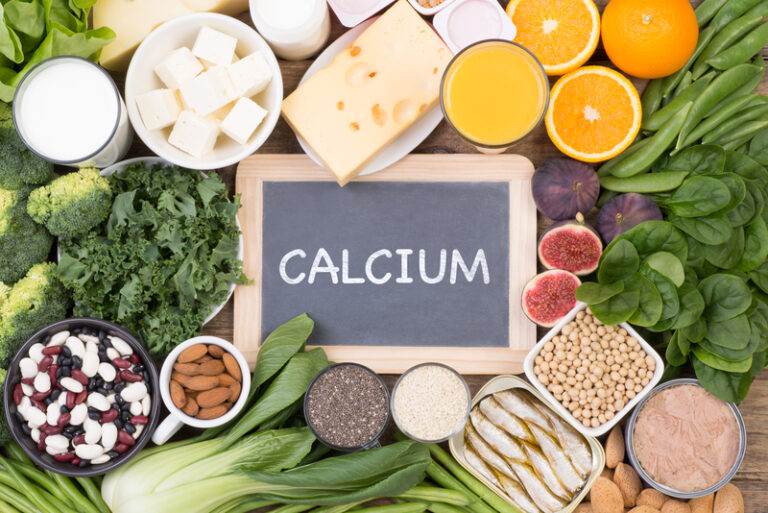Over the past couple of months, news headlines are firing off articles about calcium appearing to be more foe than friend. How can that be? For years, we have touted the benefits of calcium – not just the benefits, but the absolute necessity of it! So why the sudden about face?
Recently, a large Swedish study concluded that calcium intake in pill form contributed to an increase in cardiovascular disease and had only a nominal effect on bone health. This was especially true in doses greater than 1400mg/day. Why?
First of all, the study was missing some vital key components essential to giving an honest assessment, rather than a blanket statement about calcium pills. What type of calcium did they take? Did they have the other co-factors necessary for calcium utilization? Did they have the digestive capacity to break it down into a usable form? What underlying mechanisms may have been amiss, such as hormonal imbalance, kidney deficiencies, digestive capacity, etc.?
Not all calcium is the same. The type of calcium probably used in the study was calcium carbonate. This is by far the most used form of calcium in pill form because it’s cheap. Calcium carbonate is ground up shell and rock, barely assimilable and only by a healthy digestive system. You need sufficient hydrochloric acid in the stomach to break it down, and not be inhibited by anti-acid medications. Calcium carbonate also soaks up much of the hydrochloric acid, leaving you depleted of essential stomach acids and enzymes, leading to chronic indigestion and heartburn. Calcium lactate (not a dairy form) is the easiest form to assimilate. What counts in calcium is that it’s usable. Useless forms of calcium provide the backdrop for diseases such as cardiovascular plaquing, arthritis, cataracts, plaque on our teeth, kidney and gallstones, and nervous system communication issues.
Calcium also needs essential co-factors for its uptake. Essential fatty acids, especially saturated fats, are needed for transporting the calcium from the blood into the tissues or vice versa. They are also needed to utilize the fat-soluble vitamins A, D, E & K2 that play additional roles in calcium uptake, utilization or protection.
The building blocks for healthy bones, joints, teeth and some metabolic processes include not just calcium, but amino acids/proteins, enzymes, magnesium, sodium, potassium, iodine, inositol, and the vitamins listed above. The minerals provide the hardening factors, but without these other materials, minerals alone cannot reverse calcium depletion in the body.
Other factors not included in the study are known calcium-inhibiting factors. Many medications, alcohol, coffee/caffeine, smoking, phytic acid, oxalic acid, excess cortisol, excess dietary fiber, excess sodium chloride (table salt), and sugar contribute to loss of calcium from the blood or tissues.
Hormones play key roles in calcium metabolism. Imbalance in calcitonin (responsible for regulating healthy blood levels of calcium), insulin, estrogen, parathyroid hormone, and a few others, results in improper blood-tissue ratios of calcium.
Physical activity, sun and other lifestyle factors also play a role in how calcium is utilized. Organs involved in calcium metabolism include the thyroid, parathyroid, hypothalamus, digestive system, small intestines, kidneys, and bone. Any issues with these systems can affect healthy calcium levels.
In addition to its role in healthy bones and teeth, calcium is needed for muscle tone (especially the heart muscle), strengthening and repair of muscle and connective tissue, it is essential for viral or bacterial infection, allergies, immune response, healthy sleep, hormonal signaling, it acts as a coenzyme for clotting factors, stabilizes blood pressure, needed for normal brain function, cell communication, insulin response, muscle contraction, assists the movement of sperm into an egg to fertilize the egg, supports heart contraction, needed for soft tissue repair, emotional health and it is a physiological relaxer.
Its clear calcium is needed, but can you get enough from just foods, and not have to take calcium pills? According to Dr. Donald Davis, University of Texas Biochemical Institute the nutrient value of 43 common crops has declined over the past 50 years. Dr. Firman E. Bear a biochemist and bacteriologist, scientist, and conservationist, said that more than half of the nutrients studied showed significant declines in the past 50 years, especially in protein, calcium, phosphorus, iron, riboflavin, and ascorbic acid, due to devitalization of the soil. He stated that trace minerals such as cobalt, copper, and manganese were often absent in plants grown in standard and poor soils.
The best sources of calcium are vegetables, especially the green leafy vegetables. But since most people don’t eat the 1-2 cups needed per day, we come back to the necessity of pills. The solution: if you don’t get enough calcium from foods, get it from pills. Calcium lactate is the best, carbonate is the worst. Get your minerals in a comprehensive blend sourced from plants, include fats when you eat minerals, get ample exercise, eliminate the inhibitors such as sugar, coffee and acid-forming foods, and get your enzymes and hormonal balance up to par. Doing this makes calcium our friend, not foe.
© 2013 Holly A. Carling, O.M.D., L.Ac., Ph.D.







